This article was co-authored by Adrienne Youdim, MD. Dr. Adrienne Youdim is a Board Certified Internist specializing in medical weight loss and nutrition and founder and creator of Dehl Nutrition - a line of functional nutritional bars and supplements. With 10+ years of experience, Dr. Youdim uses a holistic approach to nutrition that blends lifestyle changes and evidence-based medicine. Dr. Youdim holds a BA from the University of California, Los Angeles (UCLA) and an MD from the University of California, San Diego (UCSD). She completed her residency training and fellowship at Cedars-Sinai. Dr. Youdim holds multiple board certifications awarded by the American Board of Internal Medicine, the National Board of Physician Nutrition Specialists, and the American Board of Obesity Medicine. She is also a Fellow of the American College of Physicians. Dr. Youdim is an Associate Professor of Medicine at UCLA David Geffen School of Medicine and an Assistant Professor of Medicine at Cedars-Sinai Medical Center. She has been featured on CBS News, Fox News, Dr. Oz, National Public Radio, W Magazine, and the Los Angeles Times.
There are 7 references cited in this article, which can be found at the bottom of the page.
This article has been viewed 22,061 times.
Carb cycling refers to an eating regimen that is based on cycling between days of high carbohydrate intake and days of low carbohydrate intake.[1] This concept was developed in the bodybuilding industry, but many sports professionals also found that this method can be very effective for healthy weight loss when coupled with a good exercise routine.
Steps
Learning How to Carb Cycle
-
1Choose a method. There is no one correct way to carb cycle. People use different carb cycling plans to meet their different needs and goals. Therefore, you should choose a carb cycling plan that suits you.
- If you want to lose weight, for example, you might want to do a plan that involves low-carb days for five days each week, and then have two high-carb days.
- On the other hand, if you are looking to gain muscle, you might want to try a more even mix of four high carb days and three low carb days.
- As an example, the “classic” carb cycling schedule involves alternating for 6 days each week between high- and low-carbs. On the seventh day, you get to have a “cheat” day where you don’t need to monitor your calorie and carb intake so closely.
-
2Determine your carb and calorie goals. As a general rule, on this diet, women should plan to take in about 1,200 calories each day and men should plan for about 1,500 calories on low-carb days. On high carb days, you’ll eat slightly more calories.
- Another general rule to keep in mind when starting out is that on high-carb days you should aim to consume about 1.5 grams of carbs per pound of body weight. So if you weigh 150 pounds, you would want to consume 225 grams of carbohydrates. On low-carb days, you should try to avoid carbohydrate-rich foods, and stick to foods that are high in protein.[2]
Advertisement -
3Space out your days evenly. It’s important to try to keep a balanced schedule, which involves spreading out your high- and low-carb days so that you don’t have too many of the same days back-to-back. Instead, try to alternate, or at least spread them so that your days are fairly even.
- For example, if you are doing two days of high carbs and five days of low carbs, you might feel tempted to make both Saturday and Sunday high-carb days. However, it would be better if you spread these two days out. For example, you could make Tuesday and Saturday your high-carb days.
-
4Come up with a meal plan. One of the best ways to stay on track with your carb cycling is to come up with a meal plan for each day. Make a detailed plan regarding what you will eat for each day of the week. Having a clear plan will help keep you on track.
- An example of a low-carb day meal plan could look like this:
- For breakfast, two scrambled eggs plus half of a bell pepper.
- As a morning snack, you can have a protein shake and a handful of berries (e.g. raspberries, strawberries, blackberries, etc.)
- For lunch, have three ounces of grilled chicken with one cup of asparagus.
- For an afternoon snack, have one-third of a cup of oatmeal (cooked) with ten almonds.
- Have a three-ounce steak with two cups of steamed broccoli or cauliflower for dinner.
- For a high-carb day, your meal plan might look like this:
- Half a cup of oatmeal with walnuts and berries of your choice for breakfast
- As a mid-morning snack, enjoy an apple with two tablespoons of nut butter (e.g. peanut butter or almond butter).
- Half of a turkey sandwich on whole grain bread for lunch.
- As an afternoon snack, eat one cup of three bean salad with one cup of quinoa.
- For dinner, try three ounces of grilled chicken with one cup of whole wheat pasta topped with pesto.
- An example of a low-carb day meal plan could look like this:
-
5Monitor your progress. It is important to keep a close eye on your progress to see what is working and what isn’t working so you can adjust accordingly. If, after sticking to a schedule for a few weeks, you haven’t seen any progress, then you may need to adjust your carb cycling schedule. For example, if you’ve been eating low-carb for four days each week and high-carb for three days each week, you might want to try switching to five days of low-carb and two days of high carbs.
- Also look at the things you are eating. This diet relies on having a healthy eating lifestyle and is not a quick fix-all. On your high-carb days, you should be eating healthy sources of carbs such as fruits, whole grains, and legumes. On your low-carb days, you should still be eating healthy. Fish and lean meats, such as chicken are a good source of protein, which will help keep you from feeling hungry. In addition to that, you can eat leafy green vegetables that are low in carbs.
Staying Healthy
-
1Talk to your doctor. For some people, eating a low-carb diet may actually be beneficial for dealing with other health problems; however, there may also be some health problems that could be exacerbated by a low-carb diet. Therefore, it is a good idea to talk to your doctor about carb cycling before beginning the diet.[3]
- This is true for any major lifestyle change, not just carb cycling. It is important to learn how certain lifestyle changes might interact with any health conditions you may have before taking them on.
-
2Try to make sure your carbs are good carbs. Typically, carb cycling diets don’t restrict what you can and cannot eat. However, it stands to reason that when you do eat carbs, you should aim for foods that are healthy and unprocessed. For example foods such as rice, potatoes, whole grain bread, legumes, and other whole grains all provide a good source of healthy carbs.
- These are also known as resistant starches.
- Some people also recommend limiting yourself specifically to what are called “complex carbohydrates.” This is in comparison to refined carbohydrates, which are usually highly processed and don’t contain much fiber. Examples of complex carbohydrates include whole grains, fruits, vegetables, beans, legumes, and nuts. These will be processed by your body more slowly and will keep you feeling full for longer.[4]
- Complex carbs can allow for a more steady rise in your blood sugar, as well as benefit your cardiovascular and metabolic health.[5]
-
3Allow yourself an occasional treat. In order to stick to any diet over the long-term, you’ll have to allow yourself a reward. If you don’t, you will more than likely get frustrated and give up. Thus, you should allow yourself a cheat meal once per week. This doesn’t mean an all-out binge meal, but if you want to have a dessert with your meal or something that you normally wouldn’t eat, then allow yourself to have it.
- When you have your reward, try to really savor it. Don’t just gobble it all down without even tasting it.
- Refined carbohydrates are enjoyable in the short-term, but remember that the best carbohydrates are the ones that are nutritious and less-processed.
-
4Don’t skip breakfast. If you are on a low-carb day, you may think that an easy way to cut out some carbs (and calories) is to simply skip breakfast. However, you should not skip breakfast regardless of whether it is a low-carb day or a high-carb day. Eating breakfast is important for your overall well-being, and it often is helpful for losing weight.[6]
- If you don’t have much time for breakfast, keep it simple. You can make oatmeal in a microwave in only a couple of minutes. If you are really running late, grab a banana.
-
5Recognize problems. The idea behind carb cycling is to prevent the negative side effects that may occur as a result of a low carb diet. That said, there are risks that come with not getting enough carbohydrates in your diet, and some negative side effects may occur. If you notice any of the following symptoms, you may need to adjust your carb cycling schedule to balance out your diet.[7]
- Headaches, weakness, bad breath, feeling tired, and constipation or diarrhea may all occur if your body is not getting adequate carbohydrates.
Understanding Carb Cycling
-
1Be aware that carb cycling is designed to be easier on the body. Carbohydrates have gotten a bad reputation in the last several years. Unfortunately, this bad reputation isn’t really deserved because carbohydrates play a huge role in keeping your body functioning and healthy. Restricting your carbohydrates over the long term can have negative effects on your body. Therefore, using carb cycling, you can give your body the carbs it needs to keep going while still losing weight.[8]
- Carbohydrates are an essential fuel for your body. Without this fuel, your body slows down so that it can preserve energy.
- For example, long-term carb restriction can cause the metabolism to actually slow down.
-
2Understand that carb cycling can prevent plateaus. Whether your goal is to gain muscle, to lose fat or both, many fitness professionals believe that carb cycling offers a good way to keep your body from plateauing. Thus, if you feel that you are having a more difficult time gaining muscle, or losing that last five pounds, a carb cycle may help get you over that plateau.[9]
- This is because while you are essentially eating a low-carb diet, you are also “surprising” your body with a few days of high-carb intake. This prevents your metabolism from slowing down.
-
3Understand that carb cycling also means calorie cycling. On the days that you eat more carbs, you will also be eating more calories, and that is OK as long as your carbs are coming from healthy sources. This is because carbohydrates are simply naturally more calorie dense. On the days that you are eating low-carb, you will naturally eat fewer calories as long as you are sticking to healthy foods (e.g. lean meat, fish, and lots of leafy greens).[10]
- This is especially important to understand if you are trying to lose weight because you may be worried that you are eating too many calories on your high-carb days. In general, if you are sticking to healthy high-carb meals with reasonable portion sizes, then those extra calories won’t be a problem.
Expert Q&A
-
QuestionShould I avoid carbs to lose belly fat?
 Adrienne Youdim, MDDr. Adrienne Youdim is a Board Certified Internist specializing in medical weight loss and nutrition and founder and creator of Dehl Nutrition - a line of functional nutritional bars and supplements. With 10+ years of experience, Dr. Youdim uses a holistic approach to nutrition that blends lifestyle changes and evidence-based medicine. Dr. Youdim holds a BA from the University of California, Los Angeles (UCLA) and an MD from the University of California, San Diego (UCSD). She completed her residency training and fellowship at Cedars-Sinai. Dr. Youdim holds multiple board certifications awarded by the American Board of Internal Medicine, the National Board of Physician Nutrition Specialists, and the American Board of Obesity Medicine. She is also a Fellow of the American College of Physicians. Dr. Youdim is an Associate Professor of Medicine at UCLA David Geffen School of Medicine and an Assistant Professor of Medicine at Cedars-Sinai Medical Center. She has been featured on CBS News, Fox News, Dr. Oz, National Public Radio, W Magazine, and the Los Angeles Times.
Adrienne Youdim, MDDr. Adrienne Youdim is a Board Certified Internist specializing in medical weight loss and nutrition and founder and creator of Dehl Nutrition - a line of functional nutritional bars and supplements. With 10+ years of experience, Dr. Youdim uses a holistic approach to nutrition that blends lifestyle changes and evidence-based medicine. Dr. Youdim holds a BA from the University of California, Los Angeles (UCLA) and an MD from the University of California, San Diego (UCSD). She completed her residency training and fellowship at Cedars-Sinai. Dr. Youdim holds multiple board certifications awarded by the American Board of Internal Medicine, the National Board of Physician Nutrition Specialists, and the American Board of Obesity Medicine. She is also a Fellow of the American College of Physicians. Dr. Youdim is an Associate Professor of Medicine at UCLA David Geffen School of Medicine and an Assistant Professor of Medicine at Cedars-Sinai Medical Center. She has been featured on CBS News, Fox News, Dr. Oz, National Public Radio, W Magazine, and the Los Angeles Times.
Board Certified Internist Carbohydrates is a very broad category that includes fruits, vegetables, beans, grains, and legumes, as well as things like muffins and pop tarts. Be careful not to completely eliminate or vilify carbohydrates, since some carbs can provide satiety, help maintain a healthy gastrointestinal tract, and allow for steady changes in your blood sugar.
Carbohydrates is a very broad category that includes fruits, vegetables, beans, grains, and legumes, as well as things like muffins and pop tarts. Be careful not to completely eliminate or vilify carbohydrates, since some carbs can provide satiety, help maintain a healthy gastrointestinal tract, and allow for steady changes in your blood sugar. -
QuestionHow do I detox from carbs and sugar?
 Amy ChowAmy Chow is a Registered Dietitian and the Founder of Chow Down Nutrition, a family and child nutrition consulting service in British Columbia (BC), Canada. With over nine years of experience, Amy has a special interest in pediatric nutrition, food allergy management, and eating disorder recovery. Amy holds a Bachelor’s degree in Nutritional Sciences from McGill University. She gained her clinical experiences at residential and outpatient eating disorder treatment programs as well as for BC Children’s Hospital before starting her own business. She has been featured on Find BC Dietitians, Dietitians of Canada, Food Allergy Canada, Recovery Care Collective, Parentology, Save on Foods, National Eating Disorder Information Centre (NEDIC), and Joytv.
Amy ChowAmy Chow is a Registered Dietitian and the Founder of Chow Down Nutrition, a family and child nutrition consulting service in British Columbia (BC), Canada. With over nine years of experience, Amy has a special interest in pediatric nutrition, food allergy management, and eating disorder recovery. Amy holds a Bachelor’s degree in Nutritional Sciences from McGill University. She gained her clinical experiences at residential and outpatient eating disorder treatment programs as well as for BC Children’s Hospital before starting her own business. She has been featured on Find BC Dietitians, Dietitians of Canada, Food Allergy Canada, Recovery Care Collective, Parentology, Save on Foods, National Eating Disorder Information Centre (NEDIC), and Joytv.
Registered Dietitian Try to focus on eating as many whole, unprocessed foods as you can.
Try to focus on eating as many whole, unprocessed foods as you can.
Warnings
- This method may not be suitable for everyone. If you have health conditions, you should talk to your doctor about carb cycling before making any huge changes to your eating habits.⧼thumbs_response⧽
- Understand that while many people use carb cycling as a weight loss method, most (though not all) research on this method has been conducted on rats.⧼thumbs_response⧽
References
- ↑ http://www.precisionnutrition.com/all-about-carb-cycling
- ↑ http://www.bodybuilding.com/fun/carb-cycling-for-six-pack-abs.htm
- ↑ http://www.mayoclinic.org/healthy-lifestyle/weight-loss/in-depth/low-carb-diet/art-20045831?pg=2
- ↑ http://www.onegreenplanet.org/vegan-food/benefits-of-complex-carbs-and-the-best-ones-to-eat/
- ↑ Adrienne Youdim, MD. Board Certified Internist. Expert Interview. 11 September 2020.
- ↑ http://www.consumerreports.org/cro/magazine/2014/10/why-eating-the-right-breakfast-is-so-important/index.htm
- ↑ http://www.mayoclinic.org/healthy-lifestyle/weight-loss/in-depth/low-carb-diet/art-20045831?pg=2
- ↑ http://www.precisionnutrition.com/all-about-carb-cycling
- ↑ http://www.bodybuilding.com/fun/wescott4.htm
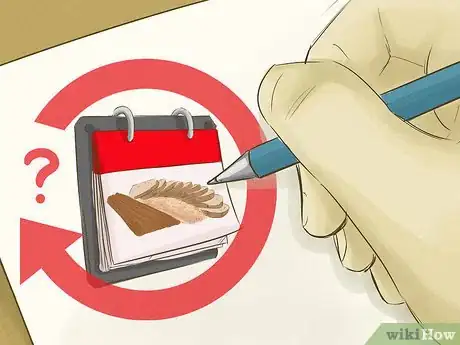
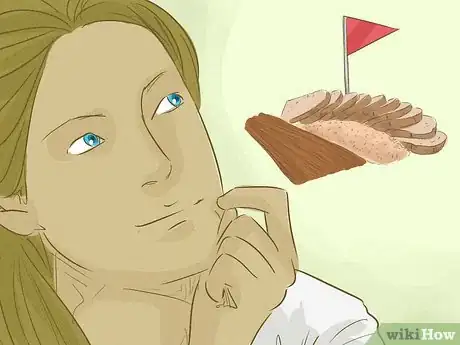
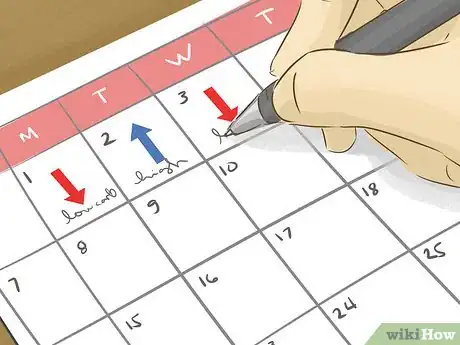
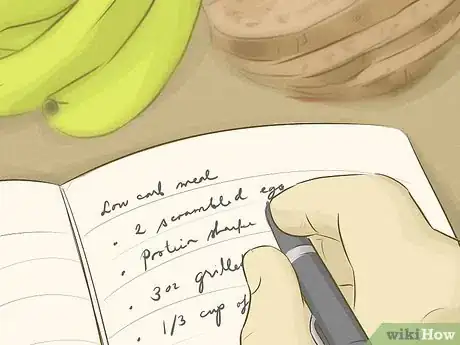
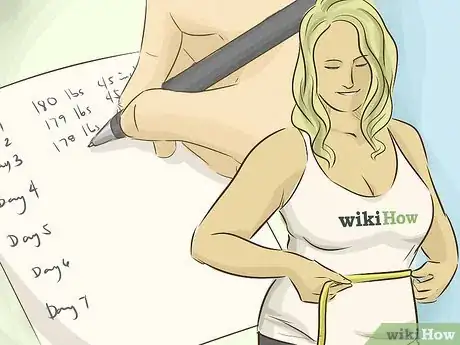

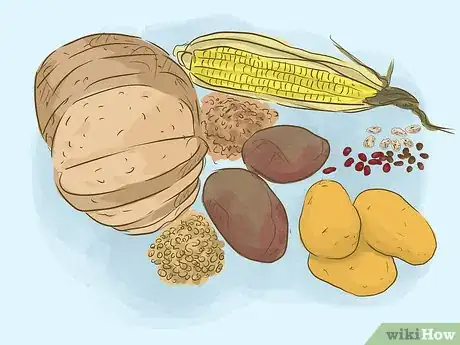

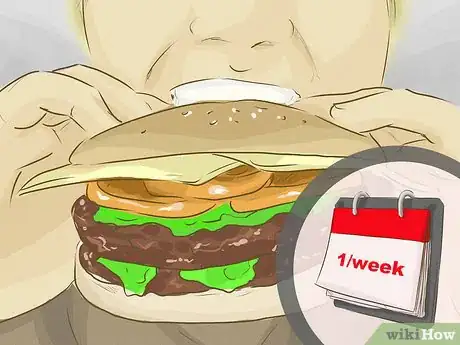
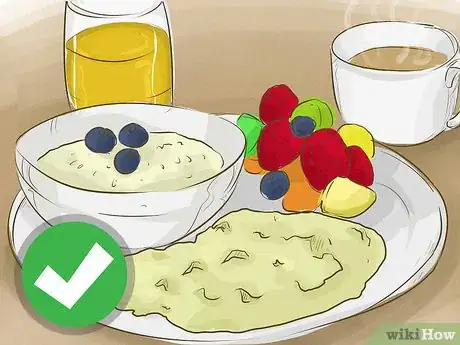
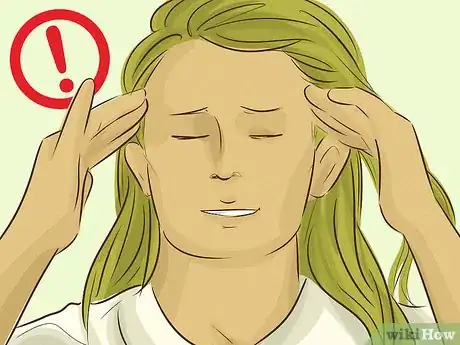
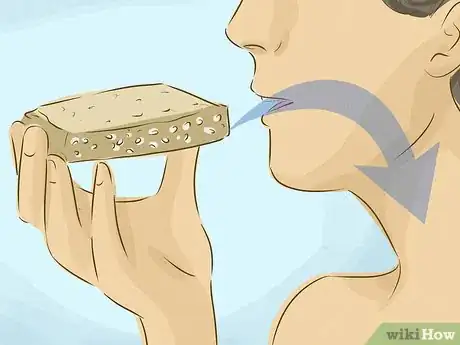
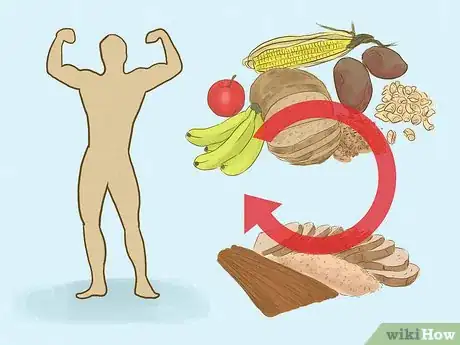
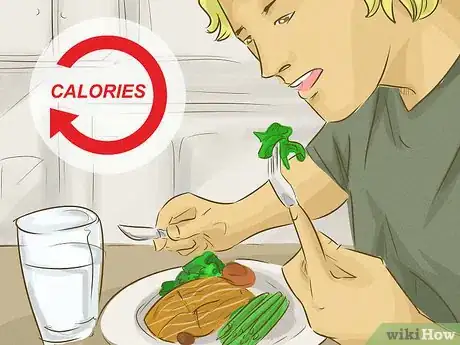














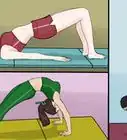




































Medical Disclaimer
The content of this article is not intended to be a substitute for professional medical advice, examination, diagnosis, or treatment. You should always contact your doctor or other qualified healthcare professional before starting, changing, or stopping any kind of health treatment.
Read More...